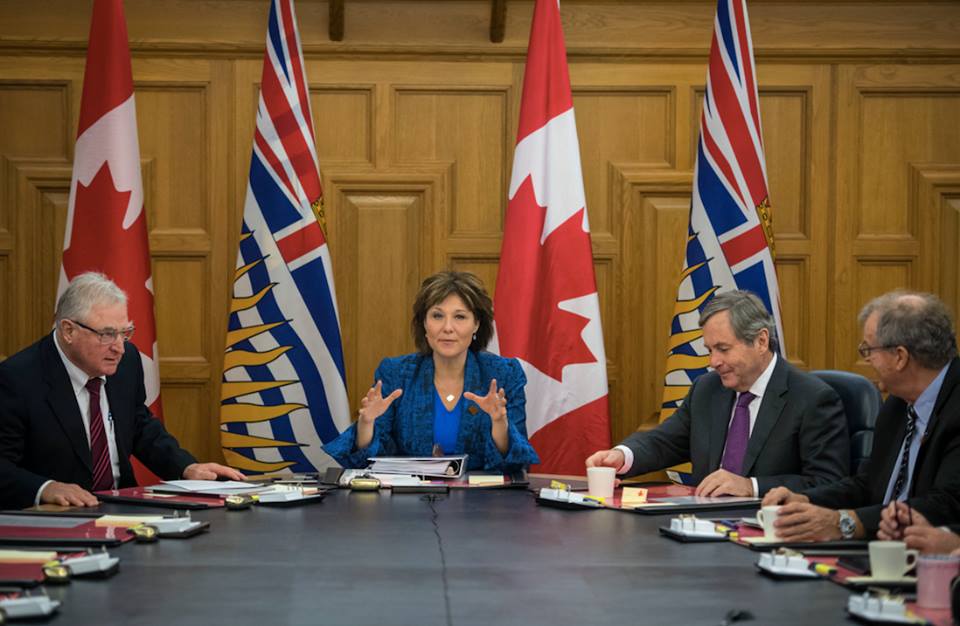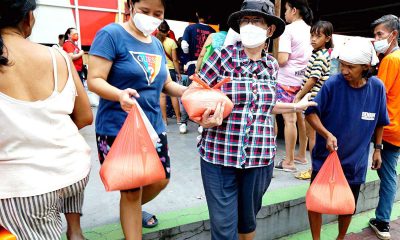Canada News
B.C. medical services premium cut a strategic ‘bang for the buck,’ Clark says

Clark touted the Liberal government’s fifth consecutive balanced budget on Wednesday at two events in the Vancouver area. B.C.’s economy grew faster than any other province in 2015 and 2016, driven largely by a real estate boom, and Clark said she had a $2-billion surplus to work with this year. (Photo: Christy Clark/ Facebook)
BURNABY, B.C. –Premier Christy Clark says slashing British Columbia’s health premiums in half gives the “biggest bang for the buck” to taxpayers, but an economist says she should have replaced the fees with a fairer tax to avoid losing $1 billion in revenue.
Clark touted the Liberal government’s fifth consecutive balanced budget on Wednesday at two events in the Vancouver area. B.C.’s economy grew faster than any other province in 2015 and 2016, driven largely by a real estate boom, and Clark said she had a $2-billion surplus to work with this year.
Clark told reporters in Burnaby that her government wanted to return the cash to taxpayers. It considered cutting the provincial sales tax, but decided slashing medical service premiums would keep more money in middle-class families’ pockets.
“What I was looking for was a way to deliver a billion dollars in tax relief that would be focused squarely on people who are in the middle class. This is the one that had by far the biggest bang for the buck,” she said.
Clark said a one-per-cent cut to the sales tax would have saved middle-class taxpayers $200 a year, while a planned 50-per-cent cut to medical premiums announced in Tuesday’s budget will save them up to $900 a year.
A sales tax cut would have benefited wealthier people the most because they spend more money on purchased goods, she said. The PST does not apply to many basic goods and services or housing.
The cut in medical premiums affects households with an annual net income of up to $120,000. It will take effect in January 2018 and reduce the government’s income by $1 billion
Clark’s government has promised to eventually eliminate the medical premium, a fee that no other government in Canada imposes and which brought in $2.4 billion annually.
However, she refused to provide a timeline for its elimination, saying it will depend on how quickly the B.C. economy grows.
The pace of growth in B.C. is expected to slow this year. There has been a slowdown in the sales of detached houses in Metro Vancouver, a key source of property transfer tax revenue.
The premier later told the Vancouver Board of Trade that she “hates” the medical premium.
“I just think it’s a terrible tax. Nobody else in the country pays it. It’s regressive. It’s absolutely the worst way to tax people.”
Iglika Ivanova, a senior economist with the Canadian Centre for Policy Alternatives, said the government should eliminate the premium and replace it with a fairer tax.
“I don’t think we are in a position to give up on this revenue,” she said. “My concern is that we could have used this money for something that would have improved services much more than what people can buy with $37.50 a month, or $75 a month if you’re a family.”
Ivanova said the medical premium is unfair because it is not based on income. People who earn less than $26,000 do not pay the fee and people who earn between that amount and $42,000 pay a range of premiums, but all earners above $42,000 pay the same amount.
She said two provinces had similar fees and eliminated them. She called for B.C. to take Ontario’s approach. It axed its health fees in 1990 and replaced them with a combination of a personal income tax and a business tax for companies that were paying the fees for their workers.
Alberta, on the other hand, was rich with oil revenues and decided to kill the tax entirely.
“We kind of know where that ended,” said Ivanova, referring to Alberta’s downturn in fortunes as oil prices dropped. “I’m surprised to see the B.C. government’s taking the same approach at this point.”
The fees go toward general government revenues. The fiscal plan tabled Tuesday projects spending on health care to increase by $4.2 billion over the next three years.
“I think everybody in the room knows that MSP premiums don’t go to pay for health care,” Clark told the Vancouver Board of Trade. “It all ends up in one big pot of money.”





















